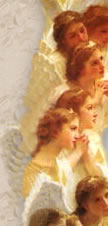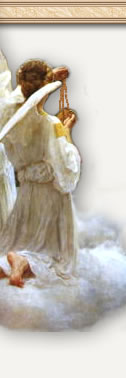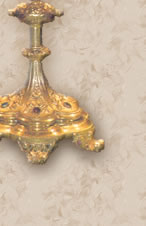




 |
|

|
|
|||||||||||
|
|
|
|
||||||||||||
 |
|
|
||||||||||||
 |
|
 |
|
|||||||||||
|
|
||||||||||||||
 |
 |
|
|
|
|
The Collapse-and Rebirth-of
Sacred Music Tucker: What are your thoughts on what passes for sacred music in most Catholic parishes today? Morris: There's nothing sacred about it. The tunes, rhythms, and messages are drawn mainly from secular culture. When it isn't aesthetically repugnant and downright offensive to the Faith, it is utterly forgettable. Ironically, we live in times that are awash in authentic sacred music. We hear it in concert halls, on our CD players at home, in our cars, in movies, on television, in shopping centers and even in Protestant churches. Never have so many recordings of the great Masses and motets been in wider circulation. Record stores have whole sections devoted to the chant. Groups such as the Anonymous Four, the Tallis Scholars and the Monteverdi Choir perform Catholic music to sold-out audiences wherever they go. I just heard a young honors chorus from Georgia, which consisted of a gaggle of Methodist, Baptist and Presbyterian kids. They gathered together for a secular concert, under a world-famous conductor, and what do they do? A Haydn Mass, the Mozart "Salve Regina" and a Padre Martini motet-an all-Catholic program! Catholic liturgical music, it would seem, is everywhere but in the Catholic Church itself. Only the Catholic Church seems blind to its power. This is one of the greatest travesties of the post-Conciliar period. We've abandoned the sacred treasury and replaced it with drivel. Tucker: Do you consider it a sacrilege that Catholic treasures are so freely put to use in the secular world? Morris: It bothers me when I hear it in a car commercial or some such. But for the most part, it's better than seeing sacred music relegated to the scrap heap. The renaissance of sacred music in the secular world occurred in the last 25 years, precisely the period in which the Catholic liturgy itself was shredded. Its secular revival, then, may be God's way of preserving it in spite of current liturgical trends. I see no reason why the Catholic Church shouldn't reclaim its rights to this music in the context of a fully restored Roman rite. Tucker: The usual line is that Catholics can't sing. Morris: When the truth is that there would be no great Western music, and certainly no decent choral repertoire, without the Catholic faith. For two thousand years, the Church has guided the development of music, carefully legislating to fuse artistic talent and aesthetic beauty with the demands of the Faith. Thus the slogan should be reversed: Catholics taught the world what music is supposed to sound like, and, more importantly, what it is supposed to mean. And then in one fell swoop in the 1960s, it all came crashing down. Even Catholic parishes today are not wanting for talent. But no serious singer or organist will get anywhere near the typical music program, at least if he wants to retain his self-respect. The pastor of a parish will typically have no education in the chant or in music, and he will hire the first music director who walks through the door. The pastor doesn't even ask whether the person knows anything about Catholic music; and the truth is that there isn't anything to know anymore. The democratic and pedestrian character of the new Mass itself seems to invite the ditties that pass for hymns these days. And this speaks to the larger problem that no one wants to talk about: the restoration of the Roman rite is a precondition for a long-term fix for the problem. Tucker: What about the claim that the people need to participate in music? Morris: For 35 years, Catholics have had people beating them over their heads, screaming: sing, sing, sing! And yet congregational hymns in the Protestant sense are not part of the historical Catholic experience, except at extra-liturgical services like novenas and at Low Mass. This contradiction is a major reason why Catholic music is in such disrepair. Yet anywhere serious Catholic music is used at Mass, the people come to love it. It's just that they haven't been exposed to it. At St. Francis de Sales, the faithful sing the Asperges, the Gloria, the Credo, and the recessional very loudly and with great enthusiasm. In these parts of the Mass, the schola could drop out completely. At the same time, I don't see that much active singing in most Novus Ordo parishes. When these silly songs come on, many people just stand there befuddled as an invasive band of noisemakers pounds away. Where's the participation in that? In fact, I've always suspected that this participation claim is just subterfuge. Many pastors just fear aspiring to something other than the most bland mediocrity; they don't want to be called snobs and they have no sense that the liturgy of the Holy Sacrifice of the Mass requires special music. Participation is easily obtained with Latin chant. The "Jubilate Deo" collection of simple chants sent out by Paul VI in 1974 is a snap. Anyone can pick these chants up very quickly. There is no excuse for not preserving the chant or not making it an active part of the Catholic liturgy everywhere. Tucker: But it turns out to be much easier in the traditional Mass. Morris: Infinitely so. You run into problems if you try to use a complete Mass setting and traditional polyphony in the Novus Ordo Mass. For example, the General Instruction on the Roman Missal (GIRM) requires the people to sing the Sanctus, which it erroneously calls an "acclamation" instead of a hymn. This effectively precludes the use of a polyphonic setting. So much for one-fifth of the great liturgical music written over the last thousand years. If you bend the rules and use a polyphonic setting of the Sanctus, you've got people waiting there too long for it to finish. That's because the priest has to wait for it to finish to begin the Canon because he is required to say it aloud. Then, if you have people waiting through the Sanctus and the Benedictus before the Canon begins, it unbalances the Mass. Similarly with the Agnus Dei. The GIRM says that it is to be sung or said by the congregation. The only part of the sung ordinary that the GIRM "concedes" can be the choir's alone is the Gloria. So much for another three-fifths of the great liturgical music. Inaudible prayers, particularly of the Canon, which at first don't seem to have anything to do with music, end up being a very important part of the aesthetic of the traditional structure of the Mass. Getting rid of them created all sorts of unforeseen problems that have warred against good music. The same is true of the Mysterium Fidei, which the new Mass ripped out of the words of consecration to tag it on afterward. Well, there is no music written for this because such a thing never existed in the Christian liturgy before. The hacks got busy and composed a bunch of little jingles to interrupt your prayers as you contemplate the sacred mystery that has just gone before. There's nothing stupider than bursting into song for seven seconds and then falling silent again. But most parishes are at a complete loss to know what else to do with these "memorial acclamations." Even the chant given in the common tones for the Latin Novus Ordo for this "acclamation" had to be made out of the "Crucem Tuam" antiphon for Good Friday. It's the same way with these elaborate Amens at the end of the Novus Ordo Canon. What's the point? They call it the "Great Amen"-as opposed to what? The other inconsequential Amens, I suppose. In the traditional rite, this Amen is short and sweet. That just scratches the surface of the problems of making the new rite work with traditional music. Tucker: And yet the Council document on liturgy calls the traditional music "a treasure of inestimable value, greater even than that of any other art." Morris: Yes, but the Council documents are so incredibly ambiguous. A minefield, really. For example, the document you refer to says Gregorian chant is especially suitable in the Roman liturgy, and it should be given pride of place. But then it adds: "all other things being equal." What does that mean? In context, it means so long as everybody can sing it and everybody approves. Well, that will not happen. Take a look at the first altar Missal printed in the United States after the 1963 Constitution on the Sacred Liturgy. All the rubrics are in Latin, consistent with the traditional Mass. But the Introit, for unexplained reasons, is entirely in English, and only in English. Therefore the Gregorian chant becomes useless. Why? Because there is no chant music for the Introit in English. But it gets worse. The intonations are in still in Latin, and then the remainder of the entire sung ordinary is printed only in English. The sung ordinary! In the pre-Conciliar Church, everyone knew the Kyrie, the Gloria, the Sanctus, the Agnus Dei and even the Credo, in their liturgical languages. And yet the 1964 Missal scraps the Latin altogether in these parts. So much for the chant. So much for "pride of place." The reformers didn't have enough pride in the chant to preserve it even in the months after those words were approved. It was a step-by-step procedure that led up to the 1970 Missal that spelled the end of the rite. The destruction of the music had been accomplished by the time that Missal was promulgated. Tucker: Annibale Bugnini says the musicians were the primary resistance force. Morris: Just by watching the debate, they could tell what was happening. All over the world, choirmasters, professors and performers had been going about their business, forming choirs and making some progress in spreading the chant and polyphony. Musical societies were thriving. Then one day they woke up and it was all over. Their texts had been abolished. The liturgical framework that made their art possible was dispensed with and replaced with something completely unfamiliar. Making matters worse, there was no guarantee the reform was over. There were hints that it would go on forever. Why would anyone compose for an endlessly changing liturgy? Why bother? Music had always been the handmaid of the Roman liturgy. Then suddenly the Roman liturgy disappeared as we knew it. With the good musicians out of the way, the hacks took over. Guitar-strumming Jesuits, who had never focused on the arts, and others, began to dominate Catholic music. Dan Schutte and Marty Haugen became the Palestrina and Victoria of our epoch. Incredible. All you hear Catholics turning out these days are pop versions of the old Protestant anthems. Catholic publishing houses grind out this stuff and make zillions of dollars. But there is nothing worth anything in it. Certainly nothing of lasting value. You can count on one hand the number of Novus Ordo churches in this country that feature a fully Catholic music program of any quality, consistent with the Roman rite tradition. And to some extent, they all bend the rubrics. They have to. Tucker: The current fashion seems to be for the "blended" Mass, in which you have a little old music together with a little new. Morris: An old friend of mine in Atlanta was telling me about the music at his parish. He said it was a wonderful mix of the old and the new, and said, "I think that's important, don't you?" I told him it was like preparing a glorious dish for someone and then at the last minute throwing some dead flies in the mix, to avoid being accused of elitism. It tends to bring the level of the whole experience down, and rather dramatically. In cathedrals that attract international visitors, you often hear tapes of monks singing when Mass isn't going on. But that turns out to be strictly for show. When Mass begins, out come the guitars and the maracas and the strange mix of commercial and phony folk music begins. It's a very strange scene. It reflects a deep spiritual incoherence. Tucker: There don't seem to be many encouraging signs that this will end soon. Morris: Not so long as the current liturgists are in charge. It's crucial to understand that the origin of all of this began even before the Second Vatican Council closed. The destruction of the treasury of sacred music was part and parcel of the whole plan. Bugnini certainly had that in mind. The reformers stripped out distinctive Catholic prayers and liturgical forms, so it was hardly surprising that distinctive Catholic music was gone too. For example, vernacular hymns at High Mass were traditionally legislated against by the popes. Pius XII underscored the teaching of his predecessors in this regard. Chant and polyphony were the norm. But nowadays hymns are the norm, because people don't have much else to sing. Even some Tridentine Masses miss the proper course. They are often hymn-ridden as well. At St. Francis de Sales in Atlanta, we do not have an organ. We do not have rehearsals during the week. We do not have a professional choir. We gather an hour before Mass. And yet: every week, we do the full propers for the Masses, and a full setting of the sung ordinary. Every week. We conform exactly to the wishes of St. Pius X. This is highly unusual these days, but it is not as difficult as it first appears. Tucker: So the indult does offer hope? Morris: As far as I'm concerned, it offers the only hope. It is absolutely essential that pastors of these communities encourage good music. Sometimes that means telling nostalgic lay people who think vernacular hymns belong at High Mass that they do not. It means working to cultivate the chant and fund the choir by making good sheet music available to them. It has to be important to the individual pastor. The Fraternity of St. Peter fosters this by teaching the chant, and this is essential. The point is not to return to the way the Mass was sung forty years ago but to do it reverently and correctly now. A lovely woman in our parish, who is 86 years old, has said to me that the music is the most beautiful she has heard in her life. She had never heard this music in Mass, not even before the Council. But there was something about it that made her realize: this is our heritage and this is our faith. Once the Mass is restored to its rightful place, we will again see choirs being developed. New compositions will be written because the composers, like their forebears, will see the setting of the Mass text to music as a means of possibly expiating their sins and assuring their music's immortality. Musicians will fight for the chance to become organists and choirmasters. The faithful will clamor for it. It will again become part of a living tradition. Tucker: Do you have a blueprint for starting a Latin Mass choir? Morris: You can read about it all you want, but there is no substitute for just doing it. Don't worry about whether you sound like the monks on the recordings. You won't. The important point is to get going. You can worry about perfecting the thing later. The most accessible sung ordinary is Mass VIII. That is why it is printed in the Coalition Ecclesia Dei booklet. It is the best known of the chant Masses, relatively late in composition and has the feeling of the modern major mode. In time, when it appears you can't take that setting another Sunday, the choir can prepare Mass XI. The choir eventually needs to get copies of the Liber Usualis, which is now available, and add propers over time. And don't make a big deal about forcing the faithful to join in. They will when they feel like it, and people will be relieved not to be threatened with excommunication for not singing. As for sacred polyphony, there is no reason to be afraid of it. There is a simple Mass by Antonio Lotti that anyone can handle. Arista Publishers specializes in keeping polyphonic Masses in print. Also the Gabrielli "Missa Brevis" is well within the capabilities of the average parish. The Palestrina "Aeterna Christi Munera" is a beautiful setting, as is the "Missa Brevis." These are not overly long and not burdensome. The Byrd Masses are more difficult still, but an above-average choir can still throw them together with a few rehearsals. Incidentally, there is nothing in this literature that is more difficult than Handel's "For Unto Us a Child is Born," and practically every community chorus attempts "Messiah" every year. We are not lacking for recordings, which are a great aid in learning. Choir members can get them and rehearse at home. There has never been a time when there were more recordings available of sacred music. As I say, this is a gift from God that we should use. Tucker: What has the St. Francis de Sales Latin Mass community meant to your spirituality? Morris: Everything in the world. It is as if everything I had tried to do for thirty years has been useless by comparison. Instead of trying to cram good music into the Mass, my only frustration is that I don't have enough time to fulfill all that the Mass seems to demand. I wonder: why hasn't this Mass been there all along? Church musicians need to be aware of the awesome responsibility they have before God. It is they who must create the aesthetic structure in which the Mass is experienced by the faithful. The music at High Mass provides the atmosphere in which we pray the Mass. It can make the difference between the faithful being profoundly aware of the presence of Our Lord or being distracted from that reality. Pray for the musicians that they may desire, and have the opportunity again, to do the Lord's work.
Some Recordings by Richard Morris: Richard Morris: Organist Richard Morris: Organ Masterpieces from France and Germany (R&R records, 5801 Whispering Pines Circle, Mableton, GA 30126) Fugues, Fantasia, and Variations Sonic Fireworks |
|



♦ About The Mass ♦ Resources ♦ How To Help ♦ Contact Us ♦